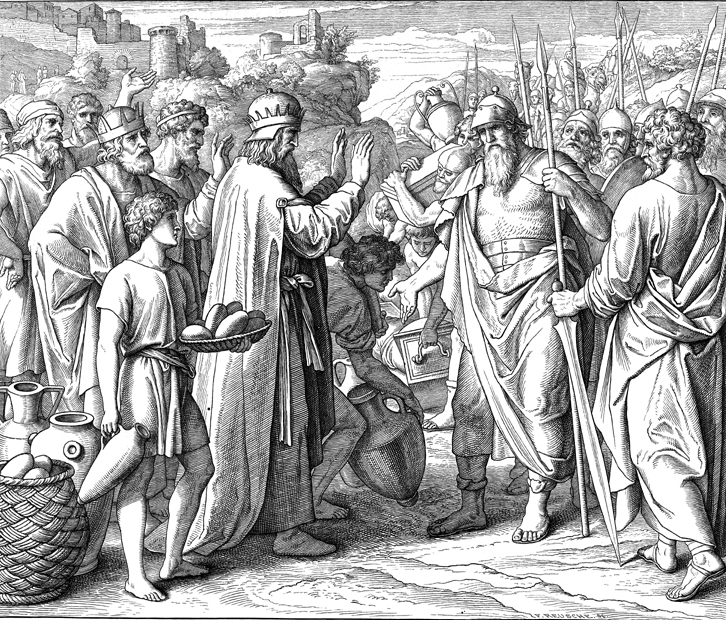TITHING (part 1)

Tithing, albeit an up to the individual act, is an obligatory ritual expected by God, from His children, in order to visit them with financial blessing. Because it involves giving, hence, a fashionable toga God desires to see His children dressed in. Unfortunately, some church leaders i.e. the leadership of Christ’s Trumpeters’ Church, in Ilesa, Nigeria, teaches against the giving of tithes in pages 129, 158, 162 & 165 of its published ‘The Beliefs And Teachings of Christ And His Apostles’ Vol. 1. 2010.
Abraham did not give to Melchizedek out of any forensic coercion. His reason for this pecuniary act is found in Genesis 14:19, “And he blessed him, and said, Blessed be Abram of the most high God, possessor of heaven and earth”. Abraham gave tithes to honour the LORD in the recognition of God being the possessor of heaven and earth, voluntarily. One of the arguments against tithe is that Old Testament tithing did not involve cash. The first ever tithe of Genesis 14:20 was in gold (a means of business transaction); 1Chronicles 21:24-25, “And king David said to Ornan, Nay; but I will verily buy it for the full price: for I will not take [that] which [is] thine for the LORD, nor offer burnt offerings without cost. 25 So David gave to Ornan for the place six hundred shekels of gold by weight”.
Abram actually gave more than 10%. Let us say that Abram brought from the war: one hundred kilograms of gold, one hundred kilograms of silver, one hundred kilograms of bronze and one hundred coins and instead of giving 10% from each of the four items he took 10 kilograms of gold (i.e. ten percent of gold) and gave it to Melchizedek, he had given more than 10%. It does not make any faith sense trying to get hold of your pen and start working out your tithes. All I do when I make money is just to decide what to give but not forgetting, however that 10% is the standard measure.
Tithes, in Hebrew is ma‛ăśer (mah-as-ayr’) ‘a tenth; especially a tithe’; and ma‛ăśer comes from a root word ‛aśar (aw-sawr’) ten (only in combination), that is, the “tens”; also (ordinal) a “tenth”; which also comes from ‛eśer (eh’ser) ‘ten (as an accumulation to the extent of the digits)’. Where ‛eśer comes from is: ‛aśar (aw-sar’) ‘to accumulate; to tithe, that is, take or give a tenth’, and ‛aśar is identical with ‛ashar (aw-shar’) A primitive root; properly to accumulate; chiefly (specifically) to grow (causatively make) rich’. Tithes, therefore, interestingly, means riches. Jacob, having struck a providential deal with God in Genesis 28:22 decided, “….and of all that thou shalt give me I will surely give the tenth unto thee”, and which was done voluntarily.
 Tithing is ecumenical. God commanded to, “Bring ye all the tithes into the storehouse, that there may be meat in mine house”, and HE went on to charge us with, “and prove me now herewith, saith the LORD of hosts, if I will not open you the windows of heaven, and pour you out a blessing, that there shall not be room enough to receive it” [Malachi 3:10]. The ecumenical position of tithing must needs lead us to the garden of Eden where out of seven days, one Sabbath is offered to God in total recognition that creationism is a proof of His ownership of all that is in existence. When we sinned we were told to offer a sacrificial appeasement; and when man began to increase in population, business was inescapable so Abram, the father of faith, was smart enough to give in honour of the true Possessor. This way the father of faith had outwitted the inroad of the cankerworm proclivity of Satan. Abram gave the best of the war booty because he understood that the angels of heaven gave, day and night, all the best of themselves, holding back nothing.
Tithing is ecumenical. God commanded to, “Bring ye all the tithes into the storehouse, that there may be meat in mine house”, and HE went on to charge us with, “and prove me now herewith, saith the LORD of hosts, if I will not open you the windows of heaven, and pour you out a blessing, that there shall not be room enough to receive it” [Malachi 3:10]. The ecumenical position of tithing must needs lead us to the garden of Eden where out of seven days, one Sabbath is offered to God in total recognition that creationism is a proof of His ownership of all that is in existence. When we sinned we were told to offer a sacrificial appeasement; and when man began to increase in population, business was inescapable so Abram, the father of faith, was smart enough to give in honour of the true Possessor. This way the father of faith had outwitted the inroad of the cankerworm proclivity of Satan. Abram gave the best of the war booty because he understood that the angels of heaven gave, day and night, all the best of themselves, holding back nothing.
What and where is the ‘storehouse’? This is the first time ‘storehouse’ is used ecumenically, “For these Levites, the four chief porters, were in their set office, and were over the chambers and treasuries of the house of God” [1Chronicles 9:26]. ‘Chambers’, is lishkah (lish-kaw’) in Hebrew, meaning; ‘a room in a building (whether for storage, eating, or lodging)’, while ‘treasuries’: ‘otsar (o-tsaw’) BDB Definition: 1. treasure, storehouse a. treasure (gold, silver, etc.) b. store, supplies of food or drink c. treasure-house, treasury 1. treasure-house 2. storehouse, magazine 3. treasury 4. magazine of weapons (figuratively of God’s armoury) 5. storehouses (of God for rain, snow, hail, wind, sea). Strong’s Definition: ‘a depository’. “Of the house of God” is where the storehouse is located. Does the treasury receive its accumulation from tithes? Malachi 3:10, “Bring ye all the tithes into the storehouse”, God’s express instruction, is the affirmation. Do we still have the Church? Then, into it should the tithes continue to pour forth.
Luke 21:1, “And he looked up, and saw the rich men casting their gifts into the treasury”. ‘Treasury’ here is gazophulakion (gad-zof-oo-lak’-ee-on) Thayer Definition: ‘A repository of treasure, especially of public treasure, a treasury. It is used to describe the apartments constructed in the courts of the temple, in which the not only the sacred offerings and things needful for the service were kept, but in which the priests, etc., dwelt: Neh 13:7; of the sacred treasury in which not only treasure but also public records were stored, and the property of widows and orphans was deposited’. Gazophulakion comes from gaza (gad’-zah): ‘the royal treasury, treasure, riches’ and phulakē (foo-lak-ay’): ‘guard, watch’ and it means ‘a treasure house, that is, a court in the temple for the collection boxes’. Jesus, who was visibly irked by the activities of the outer court traders in sacrificial elements and money changers did extol the widow’s contribution into God’s storehouse, not because she gave as little as is expected but because she did not only give all she had, she also borrowed to give out of great faith, thereby, being the greatest giver.
Treasury was first mentioned in Joshua 6:19, “But all the silver, and gold, and vessels of brass and iron, are consecrated unto the LORD: they shall come into the treasury of the LORD”. Again, in case you are not sure where the treasury is, John 8:20 reads, “These words spake Jesus in the treasury, as he taught in the temple: and no man laid hands on him; for his hour was not yet come”. I have underlined that part of the verse to indicate where the treasury is. The question now is the relevance of tithing in this New Testament age. (to be continued in the next part)
Read part 2 here.
Visits: 66


